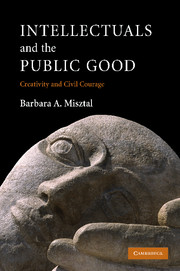Book contents
- Frontmatter
- Contents
- List of tables
- Acknowledgements
- Introduction
- Part I Theoretical framework
- 1 The authority of public intellectuals
- 2 Creativity: the problem of the new
- 3 Courage: acting on conviction
- 4 Typology of engagements
- Part II Public intellectuals: the case of the Nobel Peace Prize laureates
- Conclusion
- References
- Index
1 - The authority of public intellectuals
Published online by Cambridge University Press: 22 September 2009
- Frontmatter
- Contents
- List of tables
- Acknowledgements
- Introduction
- Part I Theoretical framework
- 1 The authority of public intellectuals
- 2 Creativity: the problem of the new
- 3 Courage: acting on conviction
- 4 Typology of engagements
- Part II Public intellectuals: the case of the Nobel Peace Prize laureates
- Conclusion
- References
- Index
Summary
The definition of the intellectual
In this chapter I look at debates concerning the definition, role and authority of intellectuals. After a short presentation of various ways of defining intellectuals and conceptualising their role, I try to answer the question: what gives intellectuals the authority to speak to non-specialised audiences on matters of general concern?
As we have already observed in the introduction, the rise of the social type of intellectual, the ‘universal intellectual’, is connected with the Dreyfus Affair of the late nineteenth century in France. The modern intellectual, whose rise and fall have become distinctive and indicative phenomena of modernity (Bauman 1995; Bourdieu 1989), is defined by his or her duty to intervene on ‘behalf of rights and progress that has been delayed’ (Habermas 1989: 73) whenever societal well-being requires. This responsibility is a more worldly and secular expression of the doctrine of ‘defenders of the faith’ and it authorises intellectuals in their universalistic ambitions to represent the realm of ideas beyond narrow specialisation. ‘The Dreyfusard intellectuals believed that it was by virtue of their immersion in the world of ideas that they had the right, nay moral duty, to uphold universal ideals against even the state’ (Coser 1965: 223).
- Type
- Chapter
- Information
- Intellectuals and the Public GoodCreativity and Civil Courage, pp. 13 - 37Publisher: Cambridge University PressPrint publication year: 2007



